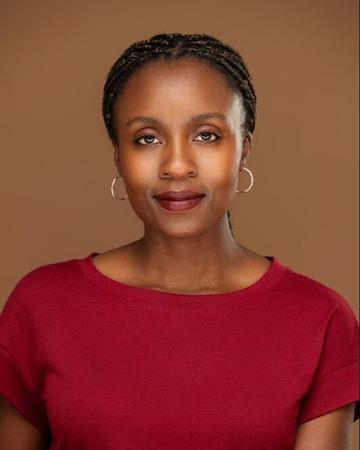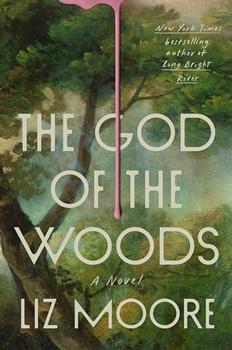
How to pronounce Afabwaje Kurian: ah-fah-bwah-jay CURE-ee-an
Author Afabwaje Kurian talks to Paul Harding about her novel Before the Mango Ripens.
Paul Harding is the author of the Pulitzer Prize–winning Tinkers and
This Other Eden. He is a Distinguished Professor of Creative Writing at
Emerson College.
Paul Harding: From the very opening, I love the complexity of
the characters and of the setting in which they are placed, that
of (at least) two different worlds or cultures. How did the idea
for this novel come to you?
I visited Nigeria in 2015 and conducted interviews with my relatives. My paternal uncle told me a story about a relative of mine
in the 1920s, who—out of compassion—carried a missionary on
his back when they walked long distances together and the missionary got tired. My uncle was nonplussed as he recounted this
story, stating it in a matter-of-fact voice. It was what it was. But
for me, it sparked many things—curiosity at what was behind the
story, disbelief, a sense of injustice at the thought that the missionary may have used my relative in this way. I mean, was this
a mutual exchange? Was my relative's charity reciprocated? Did
the missionary carry my relative on his back? So I wrote into this
image, turning it on its head in the process. In my version, Zanya
carries Reverend Jim to save his life, and in that action, there's a
physical entwining of their two worlds, and eventually a spiritual and relational entwining follows. Zanya becomes Jim's savior, and
it bothers Reverend Jim for years.
Tell us about the first line, "By sunrise, the town knew…"
I'm hoping to immediately signal to the reader that this novel isn't
about a single individual. It's about a community, and a communal
knowing. I hope to also introduce an element of mystery. Which
town is this? What does the town collectively know? The town
becomes a character.
What is the significance of the title, Before the Mango Ripens?
There is a Gbagyi proverb that inspired the title: "Before the ripening of fruit, what were the birds eating?" A common interpretation
of this proverb is "We can do without," and this is the proverb Kago
says to Zanya in reference to the locals being able to do without
the interference or presence of the Americans. For me, the title also
signifies the characters' desires and dreams. Many of the characters
are "before the mango ripens," so to speak. The period of ripening
represents a liminal space. It represents the maturing of dreams, not
the actual fruition of them. When I think of Jummai, she is before
the mango ripens. She's diligently saving, wishing for a different
situation than her home circumstances allow. I think the same for
Tebeya and Zanya and Katherine as well. Zanya is no longer content in the role of laborer. He believes there is something greater in
store for him, and it hasn't ripened yet. I think the title also represents the political state of the nation in that time period. Nigeria
was newly independent, about a decade old, having shaken off the
yoke of British subjugation and moving toward defining itself as a
nation—a ripening. I think the questions a new nation would ask
itself are: Who were we in the past? Who do we want to be in the
future? What are we ripening toward?
This novel fully humanizes its characters. You give readers an
incredible range of lives here. Zanya, by the end, is legitimately
changed. Jummai is wonderfully conflicted and torn by sorrow.
Tebeya, too, is softened by her relationship with Comfort. You
show us Reverend Jim's hardly pious will-to-power, Katherine
Parsons's jealousy and incurable bigotry, and Deloris Boyd's
apparent enlightenment. They are complicated, not simply one
"good" cut-out image or another.
There's a short quote from Janet Burroway's Writing Fiction: A
Guide to Narrative Craft that I used when I taught fiction to my
undergraduate students. It says, "All of us are gentle, violent; logical, schmaltzy; tough, squeamish; lusty, prudish; sloppy, meticulous; energetic, apathetic; manic, depressive." We are all contradictions. We are not good cut-out images. Chubz, who works behind
the counter of Glories and Blessings Ladies Provisions Store, used
to be more present in the novel. At the end of an earlier draft, I had
a scene where he was speaking to his wife. She, a faithful churchgoer and supporter of the missionaries, was upset that Zanya was
easily forgiven by the locals for his deception and saddened that
Rabata turned against Reverend Jim. In the scene, Chubz smokes
his joint and quotes the Bible, saying, "All have sinned and fallen
short of the glory of God." Essentially, he's saying, look, Zanya did
what he did, and Reverend Jim did what he did. They both told
half-truths. They both misled each other and the town. They're
both hypocrites. So who's really the villain? Who's really the hero?
Aren't we all complicated, layered, broken, and searching? Which
one of us is purely good or purely evil? For me, Chubz's response
sums up the human condition.
Because of the (still, essentially) colonial superimposition of
American and European Christian missionary culture onto Nigerian culture, it'd be easy to make all the white characters into flat cartoon villains, or all the locals into epic heroes/heroines.
Tell us how you managed to retain all of the unsavory aspects of
the missionaries' often unenlightened, paternalistic attitudes,
while simultaneously giving them real human lives.
I like to complicate my characters, try to give them understandable motivations and fears. I want them to be compelling on the
page, whether they're the antagonist or protagonist. Villains have
mothers, too, right? Even a simple statement like that humanizes a
villain. I approach writing with a lot of empathy for my characters.
I remember a workshopper saying something akin to, "I really love
Katherine. I know she's racist, and I don't think I'm supposed to
like her, but I do." I loved hearing this wrestling. Showing Katherine as hurt, jealous, suspicious, ignorant, and ultimately as human
allows readers to see her more fully, which I personally enjoy as
a writer. I find that conflict within myself. I see gray in people,
where others may see black and white. I think I'm wired to try to
find the good. I'm always seeking explanations—some might say
excuses—for what leads us to behave as we do.
The novel depicts a clash between Western and indigenous faith
practices, and among competing interpretations of Christianity. The locals, in particular, demonstrate a wide spectrum of
theological and cosmological viewpoints. How did you wish to
portray these various embodiments of and reactions to Christianity? And to what extent is your novel about reclaiming a
distinctively African Christianity?
Christianity has largely been depicted as being forced upon Africans and rarely willingly or intelligently received. There's no
question that Christianity was weaponized, a tool of the colonizer
to oppress and exploit. But I think to reject the fact that many
Africans thoughtfully considered and accepted the faith is to infantilize them or portray them as lacking agency, which also robs
them of their intelligence. Just like there was a spectrum of reactions to British soldiers and administrators—staunch opposition,
physical and spiritual warfare, or surrender—there was also a spectrum of reactions to missionaries. Those who rejected Christianity outright; those who accepted it superficially, for education or
economic progress (or for their safety when force was involved);
those who accepted specific teachings and practiced syncretism
with their traditional faiths; and those who accepted it genuinely.
I think the locals, both minor and major characters, highlight the
varied reactions. Africans were not simply passive observers. The
roots of Christianity also run deep on the African continent, so
it wasn't always and only accessed through Western missionaries.
Christianity was in Africa in the first century. The ruler of the Benin Empire sent religious scholars to Portugal to study Christianity
in the fifteenth century. Many Christians in the Philippines, Congo, Kenya, and other nations fought against Western teachings and
interpretations of the Bible and created indigenous-led churches,
striving to make this faith their own.
How did writing about this specific decade differ from your
other works of fiction, which have not been explicitly historical
in nature?
I conducted far more research for this novel. I relied on interviews
with relatives, and on many secondary sources, like The Gbagyi
Journal, Joseph A. Shekwo's Gbagyi Folktales and Myths, and An
Introduction to the History of SIM/ECWA in Nigeria 1893-1993 by
Yusufu Turaki. I read letters that Vera Thiessen, a medical missionary for the Africa Inland Mission to the Congo, wrote to her mother and sister from the 1940s to the 1970s. I read self-published
memoirs from missionaries who had lived in Nigeria for twenty
to thirty years, and Lamin Sanneh's Whose Religion Is Christianity? The Gospel Beyond the West. It was also important for me to try to
capture the ethos of the seventies. So to get myself into that mindset, besides watching video clips from that time, I wrote certain
scenes while listening to music from the seventies. When I listen
to music from the nineties, I'm instantly transported back to childhood, and specific scenes and memories appear, and I'm filled with
nostalgia and emotion. I hoped music from the seventies would
serve as an emotional gateway for me. When I wrote the scene
with the laborers in Shigudu's beer parlor, I listened to other artists
I named in the novel, like The Wings or the Lijadu Sisters. During
a particular writing session, I had Fela Kuti's "Teacher Don't Teach
Me Nonsense" on repeat for two or three hours.
At its best, the novel leaves the reader with the deepest aesthetic
sense of lived experience, expressed through a rich multiplicity
of consciousnesses. How did the ending come to you, the final
confrontation between the locals and missionaries?
I knew I wanted the novel's final scene to mirror its opening scene
in a way that shows a transformation of the town. Zanya is no
longer as centered in the final scene as he was in the opening scene.
It's about the town and not about an individual. Initially, I also
had the final confrontation between the missionaries and the town
taking place in the primary school where the missionaries held
their church services. I changed it to the mission compound in
the final draft. I wanted the locals to stake a claim to their land by
encroaching upon the mission compound property. The takeover
is not drawn out or explicitly mentioned as other takeovers, but retaking the mission compound—which has been gated and locked
and never really sees the presence of many locals throughout the
novel—is the town's quieter and final act of reclamation.
Unless otherwise stated, this interview was conducted at the time the book was first published, and is reproduced with permission of the publisher. This interview may not be reproduced or reprinted without permission in writing from the copyright holder.




Your guide toexceptional books
BookBrowse seeks out and recommends the best in contemporary fiction and nonfiction—books that not only engage and entertain but also deepen our understanding of ourselves and the world around us.